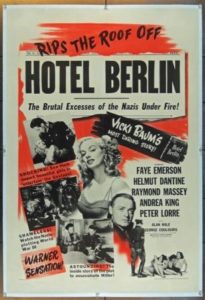“Why can’t I get Potsdam station on the telephone?”
“Maybe because it isn’t there anymore!” -Hotel Manager to Hermann Plottke (Alan Hale)
With all the streaming services and MOD companies out there, it still strikes me funny some of the movies that are not available. Among these is the Warner Brothers 1945 release Hotel Berlin, a follow up of sorts to the earlier Grand Hotel. This second installment suffers from the same flaws and lacks the all-star cast of its predecessor but makes up for it with poignant historical relevance and context.
First the big flaw. There are simply too many characters in Hotel Berlin to get familiar with them and in cramming them all in to a roughly ninety film we are left with just snippets of what could have been engaging plotlines. Luckily that is the only flaw in an extremely engaging and engrossing film. So to the cast of characters…all set in the Hotel Berlin in the closing days of World War Two.
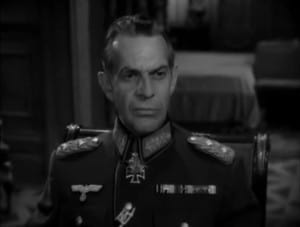 Raymond Massey is Arnim von Dahnwitz, a German general who is one of the last surviving members of the July 20th plot to kill Hitler. Unfortunately for the general, his friend and confidant Baron von Stetten (Henry Daniell) tells him he has 24 hours to commit suicide or face the People’s Court for his role in the plot. Sadly this isn’t Judge Wapner’s court, either. Von Dahnwitz is also the Butcher of Kharkov, so perhaps death isn’t unwarranted.
Raymond Massey is Arnim von Dahnwitz, a German general who is one of the last surviving members of the July 20th plot to kill Hitler. Unfortunately for the general, his friend and confidant Baron von Stetten (Henry Daniell) tells him he has 24 hours to commit suicide or face the People’s Court for his role in the plot. Sadly this isn’t Judge Wapner’s court, either. Von Dahnwitz is also the Butcher of Kharkov, so perhaps death isn’t unwarranted.
Von Stetten, played by Daniell with the same snarly vocal inflections he used as Lord Wolfingham in The Sea Hawk), is really the committed Nazi he lets on to be. He’s secretly organizing a secret getaway to South America to rebuild a new Reich. In fact, the last scene-which gives just the right ominous tone- if of von Stetten leaving the hotel with bags in hand.
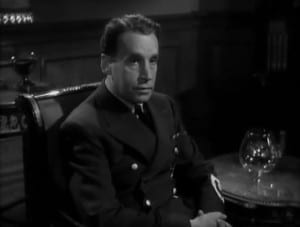 To help him build this Reich, von Stetten is wooing Johannes Koenig (Peter Lorre) a former Dachau inmate and Nobel Laureate. Though thankfully Koenig isn’t too interested in running off to South America, he’s become completely addicted to booze and drug to ease the pain of his imprisonment. Koenig is also close friends with Martin Richter (Helmut Dantine), an escaped underground leader who has been hiding out in the hotel to avoid the authorities.
To help him build this Reich, von Stetten is wooing Johannes Koenig (Peter Lorre) a former Dachau inmate and Nobel Laureate. Though thankfully Koenig isn’t too interested in running off to South America, he’s become completely addicted to booze and drug to ease the pain of his imprisonment. Koenig is also close friends with Martin Richter (Helmut Dantine), an escaped underground leader who has been hiding out in the hotel to avoid the authorities.
But back to the General: he is a busy man as his lover, the famous actress Lisa Dorn (played by Andrea King) is also in the hotel. Dorn was probably drawn up as the ‘typical’ German. Her allegiances ebb and flow with the tide, changing as opportunities present themselves to her. When the General’s affections could benefit her, she was his lover. Now aware of his fall, she distances herself from him. Likewise she is a diehard Nazi when with dignitaries, but when she has the chance to benefit her own survival by aiding Martin she somehow manages to betray him while trying to escape with him.
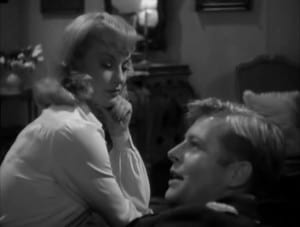 In an almost completely unrelated plotline we have Tillie Weiler (Faye Emerson), who is the vapid hostess of the hotel. She’s still not putting together that the constant air raids mean the downfall of the Germany she loves. Most of her lines involve getting a new pair of shoes. She takes up with a pilot on leave looking for a last fling before his last flight. A woman she knew before the war approaches her and asks for help for a sick relative, only to be confronted by Gauleiter Hermann Plottke (Alan Hale).
In an almost completely unrelated plotline we have Tillie Weiler (Faye Emerson), who is the vapid hostess of the hotel. She’s still not putting together that the constant air raids mean the downfall of the Germany she loves. Most of her lines involve getting a new pair of shoes. She takes up with a pilot on leave looking for a last fling before his last flight. A woman she knew before the war approaches her and asks for help for a sick relative, only to be confronted by Gauleiter Hermann Plottke (Alan Hale).
Plottke berates her for not wearing her prescribed Star of David but has the tables turned on him. We learn that Plottke was employed at a department store before the war until he was fired for stealing from the store. Ultimately Plottke is himself arrested and carted away.
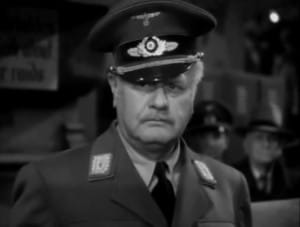 Running amok between most of the cast is Gestapo officer Joachim Helm (George Coulouris). Helm is the epitome of Nazism before he’s thrown down an abandoned elevator shaft during a scuffle with Richter, the escaped underground leader.
Running amok between most of the cast is Gestapo officer Joachim Helm (George Coulouris). Helm is the epitome of Nazism before he’s thrown down an abandoned elevator shaft during a scuffle with Richter, the escaped underground leader.
Whew! And that left out much of the plot itself!
Rushed through production to hit theaters before the war was over, Hotel Berlin feels like anything but a rush job. Coupled with a surprisingly strong score from Franz Waxman, one really gets a sense of the frantic state of affairs in Berlin in early 1945.
The two main plotlines are General von Dahnwitz’s impending death as he grapples with the consequences of his plotting and the hunt for the hiding/missing resistance leader. Of these the first is by far the stronger with the latter being strangely detached and fragmented. Perhaps it’s that Raymond Massey has more screen presence than Helmut Dantine, but as much as it feels like we should root Dantine/Richter’s eventual escape we just can’t rise beyond simple indifference.
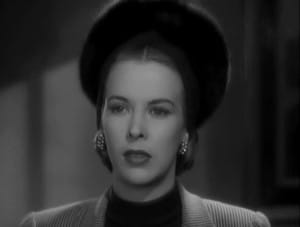 What Hotel Berlin is successful in doing is providing a slice of most segments of German life as the thousand year Reich crumbled in year twelve. We have die-hard Nazis who plot to sneak out and fight another day, Generals stripped of power and facing their demise, the feckless few left in the general population still believing in victory and worried about trivial items and the opportunists whose stories change with the winds to save their own skins.
What Hotel Berlin is successful in doing is providing a slice of most segments of German life as the thousand year Reich crumbled in year twelve. We have die-hard Nazis who plot to sneak out and fight another day, Generals stripped of power and facing their demise, the feckless few left in the general population still believing in victory and worried about trivial items and the opportunists whose stories change with the winds to save their own skins.
We also get two vignettes which could definitely been given stronger playing. The roles of both Peter Lorre and Alan Hale both show the sheer hypocrisy of the regime. Lorre’s role as Koenig shows the crushing effect the regime had on the intelligentsia in its early years, only to soften as those who managed to survive to the end suddenly had a new perceived value.
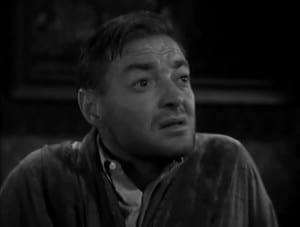 Alan Hale’s role, though perhaps played a bit as the only comic relief in the film, highlights the overall hypocrisy of not only the Gauleiters but the entire Nazi regime. Plottke wasn’t alone in rising from petty thief to powerful party elite. Himmler was a chicken farmer for goodness sake.
Alan Hale’s role, though perhaps played a bit as the only comic relief in the film, highlights the overall hypocrisy of not only the Gauleiters but the entire Nazi regime. Plottke wasn’t alone in rising from petty thief to powerful party elite. Himmler was a chicken farmer for goodness sake.
Clearly the film had some propaganda role, though perhaps more forward looking than most would think. Production was rushed a bit as it was well known that the European war was winding down. Though there is a slight bent with a few mentions of the Pacific theater (most notably a Japanese delegation checking out of the hotel), the message here was clear.
Keep your eyes on Europe- especially those recently troublesome Germans- and stop any repeat occurrence before it gets going.
